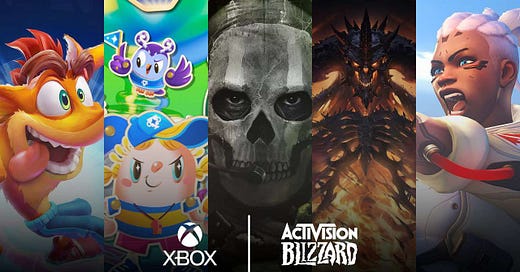The CMA reveals 75% of the UK public is in favor of Microsoft's Activision Blizzard takeover
The Competition and Markets Authority invited responses from the British public and received over 2,100 emails
➡️ The Shortcut Skinny: The public vote is in
👥 The CMA has revealed that the UK public is in favor of Microsoft’s Activision Blizzard acquisition
📧 The Competition and Markets Authority received 2,100 emails from the public expressing their opinions
👍 75% of the emails the CMA received believe Microsoft should be allowed to acquire Activision Blizzard
👎 However, 25% say the move will harm consumers, specifically those on PlayStation
The Competition and Markets Authority (CMA), the UK’s anti-competition regulator and watchdog, has shared the results of its inquiry into public sentiment toward Microsoft’s pending Activision Blizzard deal.
The CMA received 2,100 emails from the British public, and around 75% broadly favored the merger. Consumers said that the merger would “push Sony to innovate” and will “lower the price of accessing games”.
However, around a quarter of those who contacted the CMA expressed that they were against Microsoft owning Activision Blizzard, while the rest didn’t provide a clear view either way.
It’s worth noting that 500 of the total 2,600 emails were excluded from the CMA’s review because they either contained abusive content, were blank, unintelligible, or stated to be from consumers outside of the UK.
The following views were given for why Microsoft’s $69bn takeover of Activision Blizzard should go through:
Sony and Nintendo are stronger than Microsoft in console gaming, and the Merger will help Microsoft to compete more closely against them
Microsoft’s plans to add Call of Duty to Game Pass are pro-competitive and will lower the price of accessing games for consumers
Microsoft would not make Activision’s content exclusive to Xbox post-merger because it would lose significant potential revenue from rival platforms
The Merger will push Sony to innovate, such as by improving its subscription service or creating more games to compete with Call of Duty
Consumers could revert to buying games on a buy-to-play basis if Microsoft were to raise the price of Game Pass post-Merger
The Merger is a reaction to Sony’s business model for PlayStation, which has historically involved securing exclusive content or early access to popular cross-platform gaming franchises, such as Final Fantasy and Silent Hill.
Of course, not everyone wants Microsoft’s buyout to succeed. Those who argued against it included the following views:
Microsoft will make Call of Duty exclusive to Xbox, just as it did with Bethesda after it acquired ZeniMax Media
Microsoft will have the incentive to make Call of Duty exclusive to Xbox post-merger. This will adversely affect gamers who cannot afford an additional console and they would therefore switch to Xbox at the launch of the next console generation
Microsoft can capture the multi-game subscription market after the Merger because it can afford to add games to Game Pass at a loss
Microsoft is already dominant in cloud gaming, and the Merger could affect the future of new entrants into that space.
It’s clear that the UK public, or at least those who were invested enough to email the CMA, believe that Microsoft owning Activision Blizzard would be good for gamers and the industry as a whole.
The main concern raised by those who are against the deal seems to revolve around Call of Duty exclusivity, which Microsoft has repeatedly stressed will remain on PlayStation platforms
Sony has made it abundantly clear it doesn’t want Microsoft to own Call of Duty. The Japanese company has suggested that if Microsoft’s takeover of Activision Blizzard is successful, Microsoft could raise the prices of its games, consoles, subscription services, and stifle innovation in the process. That’s somewhat ironic coming from Sony, who I’ve accused of shedding crocodile tears in The Short Stack #4.
In a bid to please regulators, Microsoft could offer concessions to get the deal done and has recently agreed to put Call of Duty on Nintendo platforms for the next 10 years.
That hasn’t been enough to please the Federal Trade Commission, however, which has now filed a suit to drag the deal into the harsh light of the American judicial system.




